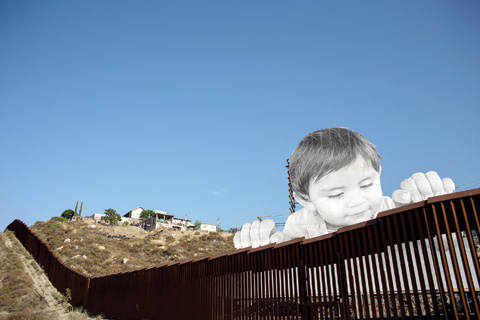State protesting major setback to their economy
 TECATE: View of an artwork by French artist JR on the US-Mexico border in Tecate, California. — AFP
TECATE: View of an artwork by French artist JR on the US-Mexico border in Tecate, California. — AFPLOS ANGELES: Donald Trump's move to scrap an amnesty for hundreds of thousands of young immigrants risks costing the US economy dearly, experts warn, and nowhere is this truer than in California which has promised a fierce fight to protect its "Dreamers." The Golden State is home to more than a quarter of the 800,000 recipients of the Obama-era program that shielded from deportation migrants brought illegally to the US as children, many of whom know no other home.
Gabriel Chin, a law professor at the UC Davis School of Law, says the program's phase-out, announced on Tuesday, promises to be "devastating" for the country's most populous state. "The uncertainty of their status, and the possibility of their removal, will put a pall over many parts of the state, and threaten serious economic and human consequences," he warned.
According to a January study by the Center for American Progress, California alone would lose $11.3 billion per year with the ending of the program known as Deferred Action for Childhood Arrivals, or DACA-more than any other US state. Officials in the state made their position clearly known, as Trump's repeal of the program implemented by president Barack Obama threw the future of its recipients into serious doubt.
"California will sue the Trump Administration over its termination of the DACA program for one simple reason," Xavier Becerra, the state's attorney general who is himself of Mexican descent, said in a statement. "Our state has become the world's 6th largest economy due in part to the success of over 200,000 Dreamers whose livelihoods have been put at risk by President Trump's wrong-headed decision on DACA."
The so-called "Dreamers"-many Hispanic, now in their twenties and having known no other country but the United States-will have somewhere between six and 24 months before they lose their protected status and become subject to potential deportation. In scrapping DACA, Trump urged Congress to settle the Dreamers' legal status-but the chances of divided lawmakers reaching a long-elusive agreement within months appear dim. Los Angeles Mayor Eric Garcetti likewise vowed his city would defend DACA recipients from a "cruel" decision. "They belong here. And we'll fight for them to stay."
'Considerable investment'
In California-the US state with the largest immigrant population and where Hispanics outnumber whites-tens of thousands of young Dreamers live and work in the agricultural Central Valley, but an even greater number live in Los Angeles. One-third are students, and could find themselves forced back into the shadows, abandoning their education and career plans.
"Dreamers have earned diplomas, been able to open a bank account, get a mortgage, bought cars," said California's state Senate leader Kevin de Leon, who is of Guatemalan descent. "They represent a bright future for our state." Louis Desipio, professor of political science at UC Irvine, notes that the state of California has made a "considerable investment" in educating many of these young people. "If they can't work up to the levels that their skills dictate, this investment is not going to pay off as well as it has in the past," he argued.
Thousands of DACA supporters have marched in Los Angeles, San Francisco and San Diego in recent days, while California schools and universities pledged to protect students from the threat of deportation, offering legal advice and counseling. Silicon Valley titans including Apple, Facebook and Google have loudly condemned the dismantling of the amnesty program.
What can be done?
Major Californian cities San Francisco, Los Angeles and Berkeley have already clashed with the Trump administration by declaring themselves "sanctuaries" for undocumented migrants, and refusing to fully cooperate with immigration authorities. Experts note however that state authorities have limited room for maneuver, considering that US immigration policy is set at the federal level. So what can be done?
California's government and police could limit their cooperation with immigration police, said UC Irvine's Desipio, or for instance craft legislation allowing Dreamers to attend university classes for free in exchange for working on campus. But that will not prevent them from losing their official work permits, granted on a renewable two-year basis under the DACA scheme, he said.
Karen Tumlin, the legal director for the National Immigration Law Center, suggested the group may challenge the constitutionality of Trump's repeal in court. "Rule of law also means keeping your promises to DACA recipients and not pulling the rug out from under them," she tweeted. "See you in court, Mr President, again." And then there are the politics, pure and simple. With mid-term congressional elections looming in 2018, Republican lawmakers risk angering their Californian constituents by doing away with the popular DACA program-something sure to give pause to party strategists in Washington. - AFP










